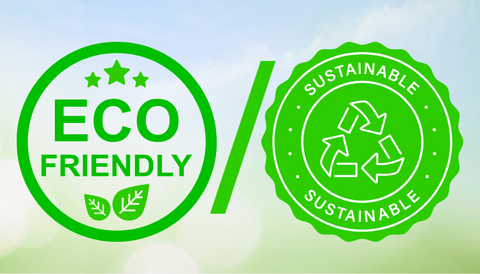Eco-Friendly Does Not Mean Sustainable: Understanding the Difference
In recent years, the terms "eco-friendly" and "sustainable" have become buzzwords in the realm of environmental consciousness and consumer products. While both concepts are related to reducing the impact on the planet, they are not synonymous. Eco-friendly practices and products aim to minimize harm to the environment, but they may not always address the broader issues of long-term sustainability. In this blog, we'll explore the differences between eco-friendly and sustainable approaches and why understanding this distinction is crucial for making informed choices in our quest for a greener future.
Eco-Friendly: A Focus on Environmental Impact
Eco-friendly practices and products are primarily concerned with reducing immediate harm to the environment. They often target specific issues such as carbon emissions, pollution, or the use of harmful chemicals. For example, using reusable water bottles, recycling, and opting for energy-efficient appliances are considered eco-friendly actions. Eco-friendly initiatives have gained traction as society becomes more aware of the urgent need to protect our planet.
 However, the eco-friendly approach may not always consider the long-term consequences of the entire product life cycle. For instance, a product may be made from sustainable materials but require significant resources and energy to manufacture, leading to a high carbon footprint. Additionally, if a product is recyclable, but there is no robust recycling infrastructure in place, it may still end up in landfills.
However, the eco-friendly approach may not always consider the long-term consequences of the entire product life cycle. For instance, a product may be made from sustainable materials but require significant resources and energy to manufacture, leading to a high carbon footprint. Additionally, if a product is recyclable, but there is no robust recycling infrastructure in place, it may still end up in landfills.
Sustainable: A Holistic and Regenerative Approach
Sustainability, on the other hand, goes beyond short-term environmental impacts. It encompasses a holistic and regenerative approach that considers the social, economic, and environmental dimensions of a product or practice. Sustainable solutions aim to meet the needs of the present without compromising the ability of future generations to meet their own needs.
Sustainable practices focus on reducing waste, conserving resources, promoting social equity, and ensuring economic viability. They seek to create closed-loop systems where materials and resources are reused, recycled, or regenerated, thus minimizing waste and preserving natural ecosystems.
Understanding the Nuances
To truly embrace sustainability, we must understand the nuances of our choices. For example:
- An eco-friendly product made from biodegradable materials may still contribute to deforestation if it is sourced from unsustainable logging practices.
- Renewable energy sources, while eco-friendly, may have environmental and social impacts on local communities if not implemented responsibly.
- Vegan and plant-based diets are often considered eco-friendly due to reduced greenhouse gas emissions. However, monoculture farming practices for certain crops may lead to habitat destruction and soil degradation.
- Striving for a Holistic Approach
While adopting eco-friendly practices is a commendable step, it is essential to strive for a more holistic approach to sustainability. This involves considering the entire life cycle of products, from sourcing raw materials to manufacturing, distribution, use, and disposal.
As consumers, we play a crucial role in demanding truly sustainable products and practices from businesses and governments. By supporting companies that embrace transparency and eco-conscious practices, we incentivize the adoption of more sustainable solutions.
Conclusion
Eco-friendly and sustainable are two intertwined yet distinct concepts. Eco-friendly practices focus on immediate environmental impact, while sustainability involves a holistic, regenerative, and long-term approach. As individuals, understanding the difference empowers us to make informed choices that promote a more sustainable future for our planet and generations to come.
Let's move beyond mere eco-friendliness and work towards creating a world where sustainability is at the core of every decision we make. By embracing the complexities of sustainability, we can collectively pave the way for a greener, healthier, and more equitable planet.





Comments